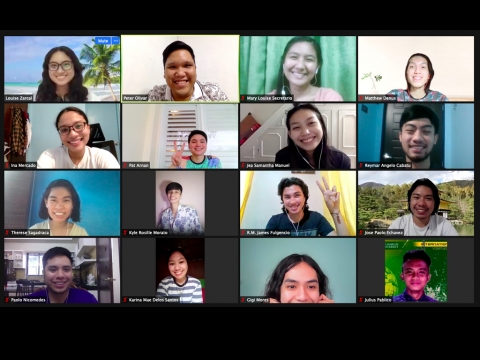The executive board of the Agriculture Students Association of the Philippines marks the launch of the organization on March 3. (photo by ASAP)
DILIMAN, Quezon City—More young Filipinos are joining the efforts to rebrand the agriculture and fisheries sector.
On March 3, the Agriculture Students Association of the Philippines (ASAP) announced its official launch “to advance the agricultural sector of the Philippines by educating, empowering, and engaging the youth.”
ASAP is a youth organization that aims to provide a virtual platform for discussion by inviting stakeholders all over the country to share their experiences in agriculture—amplifying the message that supporting this sector is key to recovery.
One of the largest coalitions of agriculture students and youth advocates in the Philippines, ASAP formally started in August 2020 in the midst of the pandemic.
“The average age of a Filipino farmer is around 57 years old. Most are not keen on letting their children follow in their footsteps as they don’t feel that farming will provide for a good future because of the lack of support in the agricultural sector,” ASAP president Paolo Nicomedes said.
“It’s our mission to re-educate the farmers about the lucrative aspect of farming by educating them about modern methods, machineries, and financial aid to uplift their way of life in recognition of their feeding the populace and contribution to the nation's economy,” he added.
ASAP aims to be the leading association to create a network of agriculture advocates and take the role of instilling the importance of agriculture to the youth, hence, ASAP—suggesting immediate attention. Through various social media platforms, the group aims to bring agriculture to the youth and make information on agriculture more accessible as they engage in conversations about matters in this sector.
“In this pandemic, we can see more clearly how important agriculture is. If there are no farmers and fisherfolk, we all go hungry,” ASAP co-founder and advisor Peter Olivar said.
From its 10 core members, ASAP has grown to 256 partner organizations across Luzon, Visayas, and Mindanao in just half a year.
“We wanted to be the bridge for agri students all over the country –to connect them with passionate leaders and inspire one another. The short-term goal is to establish a platform for the youth to prepare them to take on challenges and create innovative solutions of the agricultural sector,” Louise Zarcal, ASAP vice-president for internal affairs and co-founder, said.
As young people are seen as the key driver in boosting the agriculture sector, the Department of Agriculture (DA) and its training and advisory arm, the Agricultural Training Institute (ATI), continue to support and undertake programs and services for the youth.
These include the “Mentoring and Attracting Youth in Agribusiness” program which has reached more than 3,000 applications as of February this year. Also in full swing are the “Kapital Access for Young Agripreneurs” that offers non-collateral loan and the Go Negosyo partnership for “Kapatid Agri Mentor Me Program”, a face-to-face mentorship via teleconference of prospective agripreneurs, including the youth.
Meanwhile, ATI-led initiatives such as the “Educational Assistance for the Youth: Degree Courses in Agriculture and Agricultural Biosystems Engineering” (EAsY Agri) and the Digital Farmers Program (DFP) have also been successfully rolled out. EasY Agri aims to encourage and provide opportunities for young people, particularly children of smallholder farmers and fishers, to pursue degree courses related to agriculture.
The DFP, on the other hand, is spearheaded in partnership with Smart Communications, Inc. that aims to bridge the digital divide and generation gap among agricultural stakeholders. It serves as an avenue to invest on the youth's technology capabilities to empower and engage senior farmers in the digital space, while also introducing the sector as a field with vibrant opportunities for the youth.
“We need young blood in agriculture. They have the defining attributes when it comes to utilizing modern agriculture. They are well connected through electronic devices that can help modernize farming and fishing activities,” Agriculture Secretary William Dar had said as he advocated for the involvement of the youth in the agri-fishery sector.
Other programs implemented by the ATI are the exchange programs with Japan and Taiwan known as the “Young Filipino Farm Leaders’ Training Program in Japan” and the “Filipino Young Farmers Internship Program in Taiwan”, respectively. (with reports from the Agriculture Students Association of the Philippines)

